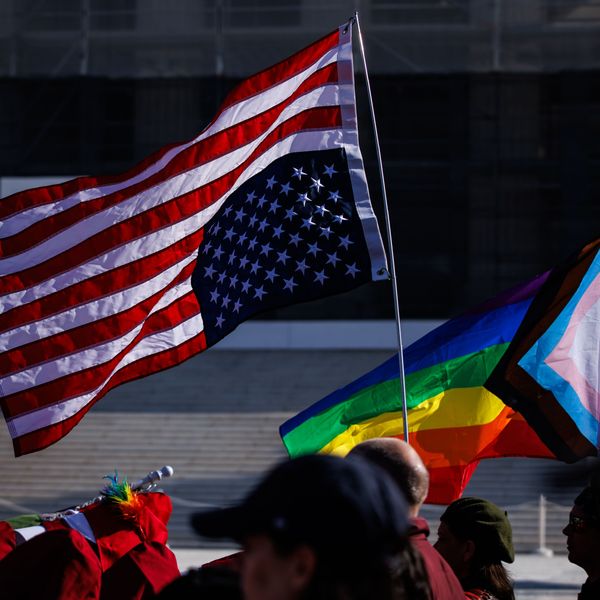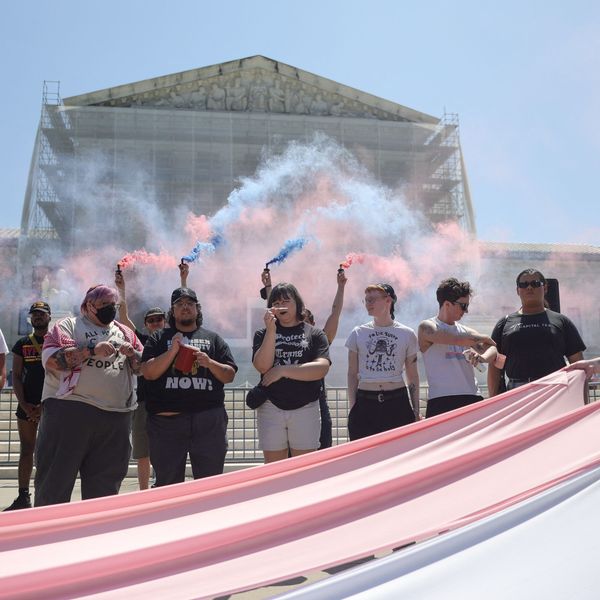The 9th Circuit Court of Appeals announced on Tuesday its refusal to hear a challenge to an earlier court ruling that called California's Propostion 8 -- which banned same-sex marriages -- unconstitutional. Foes of marriage equality have little choice but to bring their appeal to the US Supreme Court, which could hear the case as early as next winter.
Today's decision comes less than a week after the 1st Circuit Court in Boston found the Defense of Marriage Act, the federal statute that defines marriage as between one man and one woman, as also unconstitutional. Taken together, these federal court decisions heighten the possibility that the US Supreme Court may well consider the question of gay marriage at both the state and federal level.
"Two federal courts in this case have affirmed what we know to be true -- that Proposition 8 seriously infringes on the guarantee of equal protection and serves no legitimate state interest," said Equality California board member David Codell, who provides pro bono legal representation to Equality California on marriage-related issues. "We agree with the majority of the judges of the Ninth Circuit that there was no need to rehear this case because the decision to strike down Proposition 8 rested on solid constitutional principles."
"Americans of all backgrounds, including the President of the United States, are coming to understand that same-sex couples want the freedom to marry for the same reason as other loving, committed couples -- to make a lifetime commitment in front of friends and family and have the security of marriage that allows couples and families to care for one another," said Equality California Board President Clarissa Filgioun. "Through our movement's work in the court of public opinion and our courts of law, we are, with each passing milestone, one step closer to putting and end to Proposition 8 for good."
* * *
Equality California: EQCA Lauds Ninth Circuit Refusal to Rehear Case Striking Down Prop 8
The federal Court of Appeals for the Ninth Circuit announced today that it has rejected a request by anti-equality advocates to reconsider its ruling earlier this year in Perry v. Brown, which affirmed a district court decision in 2010 that struck down Proposition 8, the California constitutional amendment approved by voters in 2008 that stripped the freedom to marry from same-sex couples in the state.
"Two federal courts in this case have affirmed what we know to be true -- that Proposition 8 seriously infringes on the guarantee of equal protection and serves no legitimate state interest," said Equality California board member David Codell, who provides pro bono legal representation to Equality California on marriage-related issues. "We agree with the majority of the judges of the Ninth Circuit that there was no need to rehear this case because the decision to strike down Proposition 8 rested on solid constitutional principles."
"Americans of all backgrounds, including the President of the United States, are coming to understand that same-sex couples want the freedom to marry for the same reason as other loving, committed couples -- to make a lifetime commitment in front of friends and family and have the security of marriage that allows couples and families to care for one another," said Equality California Board President Clarissa Filgioun. "Through our movement's work in the court of public opinion and our courts of law, we are, with each passing milestone, one step closer to putting and end to Proposition 8 for good."
In 2010, U.S. District Judge Vaughn Walker invalidated Proposition 8, concluding that it violates the Constitution's guarantee of equal protection. Proponents of Proposition 8 appealed the decision in the Ninth Circuit. In February, the Ninth Circuit held in a 2-1 decision that Proposition 8 violates the Equal Protection Clause of the United States Constitution. It was the first time in the nation's history that a federal appeals court struck down a statewide ban on marriage for same-sex couples. Proposition 8 proponents requested a rehearing of the case before a larger eleven-judge panel of the Ninth Circuit, known as rehearing en banc.The request did not receive the required majority vote of the Ninth Circuit's approximately non-recused judges in regular active service needed to secure a rehearing. Proponents of the measure are now expected to appeal to the Supreme Court of the United States.
In 2010, Equality California filed a friend-of-the-court brief, arguing that Proposition 8 is "a unique and unprecedented mandate of inequality that the federal Equal Protection Clause simply cannot tolerate." Equality California's brief explained that because Prop 8 "deliberately mak[es] one group unequal to all others by carving out an exception to the equal protection of the state's laws for that group," Proposition 8 is "fundamentally inconsistent with the command of the [Equal Protection Clause] that no state 'deny to any person within its jurisdiction the equal protection of the laws.'"
The Ninth Circuit agreed. The court's opinion explained: "Proposition 8 serves no purpose, and has no effect, other than to lessen the status and human dignity of gays and lesbians in California and to officially reclassify their relationships and families as inferior to those of opposite-sex couples. The Constitution simply does not allow for laws of this sort."
# # #


